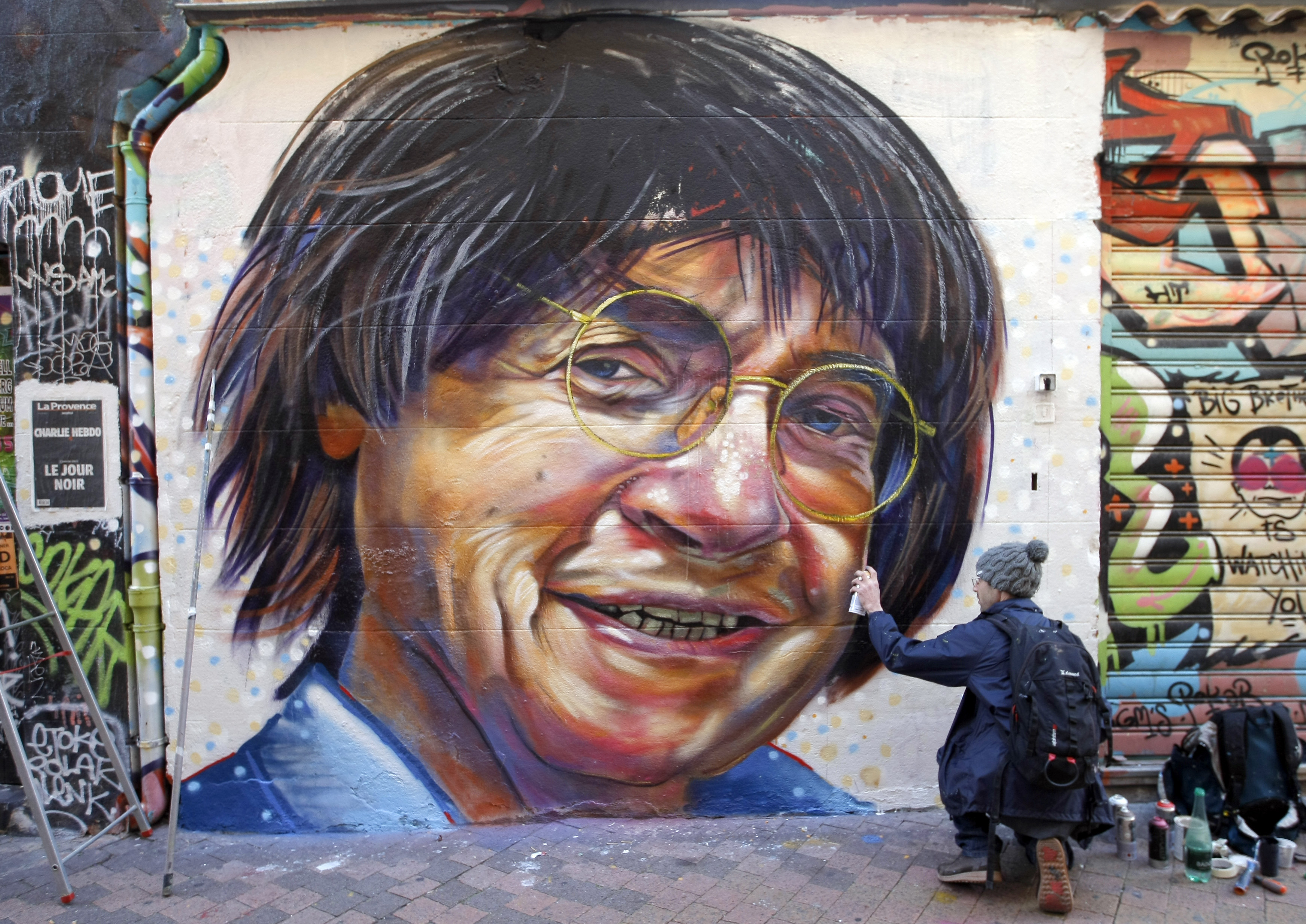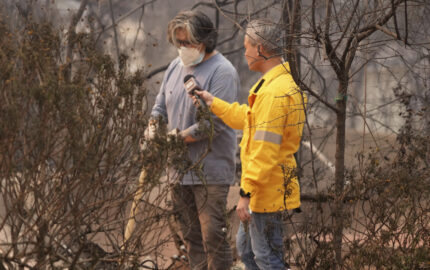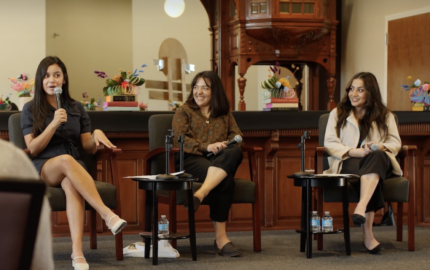A 2011 Nieman Fellow, Florence Martin-Kessler attended a vigil in honor of the slain Charlie Hebdo journalists on Wednesday night. “It was very silent, very crowded," said Martin-Kessler, editor in chief of Live Magazine. “So it was not a march. It was pretty spontaneous. There were some occasional chants about freedom of the press. It was very moving. Tons of people were crying. It felt invigorating to see all those people out there. I was surprised that there was not a lot of diversity, and that concerned me a bit. It was mostly (maybe) people like me: a bit young, a bit engaged.”
In 2006, Martin-Kessler’s friends Jérôme Lambert and Philippe Picard made “Cabu,” a documentary for French television about one of the slain cartoonists. A five-minute clip, translated into English, gives a look inside the Charlie Hebdo offices during an editorial meeting in 2006 as Cabu and his colleagues prepared to publish the Danish cartoons of the Prophet Muhammad that had already unleashed a wave of violence.
Edited excerpts of the interview with Martin-Kessler:
Do you feel the Charlie Hebdo cartoons satirizing the Prophet Muhammad crossed a line?
It is a bad taste newspaper. That’s what they are about: bad taste. They want to be going at the bourgeoisie, going at the cops, going at the capitalist pigs. Everybody knows that. Sometimes it’s not funny, but my husband who is British-American was surprised in the past couple of days [to feel that] some of the cartoons are actually pretty sharp and intelligent. They love to draw the pope [having sex with] a goat. None of the people I know buy [Charlie Hebdo] but we kind of cherish it and we're happy it’s there. And now we realize what it meant.
The Charlie Hebdo cartoonists are like a different generation of journalists. They are anti-militaristic, anarchistic, libertarian. They come from somewhere else; they’re dinosaurs. They led some fights that seem like they are not our fights right now. But when we precisely look at the whole archaeology of their history, it does make sense. They are often funny, and sometimes not funny, but it’s fine, too. I don’t think they cross any line.
My friend Corinne Bacharach who works at Le Musée d'Art et d'Histoire du Judaisme, a museum of Jewish heritage in the Marais, here in Paris, posted a link from a site called jewpop that compiled Charlie Hebdo caricatures of Jews from the past 30 years. They are just really, really provocative, but at the same time they are so incredibly funny and right on. I can’t describe them to you because they’re really vulgar, but just to tell you it’s really ironic and crazy.
It seems like they go after everyone.
Yeah, they do. My friends who did the film on Cabu told me earlier this week that Cabu used to draw cartoons that he wouldn't do anymore. He would do a lot of jokes in very bad taste about mentally handicapped children, for example. Actually when the Charlie Hebdo cartoonists say they still laugh at everything, I think there was a level of self-censorship. I don’t think they’d do anybody sitting in a wheelchair anymore. So that’s interesting.
But there’s a lot of debate about “Are they racist?” Even in France, I’ve read a few op-eds, in the middle of the eulogies, by people who don’t like them and think they’re Islamophobic. I don’t know if you can say that in English, but they are spewing an anti-Islam sentiment. Thinking about it and having spoken to people who knew them in real life, they are certainly anarchists and libertarian, but I don’t think you can say they are racist. They are playing a very thin line. They deal in outrage and provocation. But they know what they are doing.
Isn’t that also a particularly sensitive line in a place like Paris, which has a large Muslim population?
Charlie Hebdo received tons of death threats. And the key staff was living with police protection. It was pretty courageous, I feel. Even on Wednesday evening on French television, the news at 8 o’clock had this kind of panel discussion with an imam as a guest. The star anchor David Pujadas kept going, “As a moderate Muslim, do you condemn the attack?” I was reading a tweet earlier today from a guy from Norway saying, “Breivik killed 77 in Norway & no-one asked me as a white male of Nordic Christian background if I felt the need to condemn it." [In July of 2011, Norwegian Anders Behring Breivik killed 77 people at a summer camp on the island of Utøya.] Anchors are always categorizing the people they interview. What is your feeling about this or that “as a Muslim,” “as an Arab,” and this is really getting on my nerves. Really stigmatizing, I guess. Yes, France has a lot of racism in it. Like the French bourgeoisie, where I come from, makes all these kinds of jokes all the time. I grew up with it as a background noise.
What role does Charlie Hebdo play in France’s media landscape?
It’s really marginal in a way. At the same time, people are happy it’s around. I don’t know how else to explain it. There’s another satirical paper Le Canard Enchaîné [The Chained Duck], which is in the same crazy satirical vein. Not as crazy because it does investigations. Charlie Hedbo is mostly editorials and joke making, and they don’t do investigations.
What’s the role of editorial cartoons in French culture?
Le Monde every day has an editorial cartoon on the front page; it’s made by a guy called Jean Plantureux, who signs his cartoons “Plantu.” His are excellent, very funny, not as crass as the Charlie Hebdo guys, but going at it as well. People buy Le Monde and what you look at is, What has Plantureux found today? It’s below the fold, it’s right there, it’s big, it’s funny, and it delivers every day. But of course he’s not going to put a pope [having sex with] a goat, that’s for sure. He’ll make fun of the president. It’s an art for sure. It’s very political.
Could you talk about the 2006 Cabu documentary?
My good friends Jérôme Lambert and Philippe Picard directed “Cabu: Politiquement Incorrect” for French television, a one-hour portrait. Cabu [Jean Cabut, one of the slain cartoonists] is pretty famous. The filmmakers were at the Charlie Hebdo offices in early February 2006 when the paper decided to publish the 12 Muhammad cartoons, which I don’t think would happen in many newspapers in America. So Cabu had to do a front page [cartoon] for the weekly, which was of course an additional Muhammad caricature. They were doing this three months after the original publishing of the cartoons in the Danish newspaper. And things were pretty out of control in terms of reactions all over the world.
That day Lambert and Picard got film access to the newsroom at Charlie Hebdo, and they filmed that Muhammad caricature being made in front of your eyes. You realize what those guys are really about. And they are just casually drawing Muhammad, knowing it will lead to death threats. And you know since that day they have had [bodyguards]. Three of the people who died are actually in that conference room filmed during the cinema verité sequence. You see [Georges] Wolinski, you see Cabu, and you see Tignous [Bernard Verlhac], who all got killed three days ago. And you see them, they’re like, “Should the prophet say this or that?” "Should Muhammad be grinning or not?" And you see how collaborative the whole process is. And you also feel, “Oh my god, those guys, are they insane?” Don't they know they are signing up for a fatwa? But no they are not insane. they are courageous, and gracious about it. That sequence is historical in the sense that it is the countdown to the murders.
It’s crazy, just to think this group of really old alternative journalists, a bit on the fringe, that Google is now giving them 250,000 euros. Those guys would have made so much fun of the crazy turn of events. It’s really tragic. At the same time you hear Google is going to give, it’s very ironic. Because those Charlie Hebdo guys are very libertarian, they’re very hardcore anti-establishment. They hate authority figures.
In 2006, Martin-Kessler’s friends Jérôme Lambert and Philippe Picard made “Cabu,” a documentary for French television about one of the slain cartoonists. A five-minute clip, translated into English, gives a look inside the Charlie Hebdo offices during an editorial meeting in 2006 as Cabu and his colleagues prepared to publish the Danish cartoons of the Prophet Muhammad that had already unleashed a wave of violence.
Edited excerpts of the interview with Martin-Kessler:
Do you feel the Charlie Hebdo cartoons satirizing the Prophet Muhammad crossed a line?
It is a bad taste newspaper. That’s what they are about: bad taste. They want to be going at the bourgeoisie, going at the cops, going at the capitalist pigs. Everybody knows that. Sometimes it’s not funny, but my husband who is British-American was surprised in the past couple of days [to feel that] some of the cartoons are actually pretty sharp and intelligent. They love to draw the pope [having sex with] a goat. None of the people I know buy [Charlie Hebdo] but we kind of cherish it and we're happy it’s there. And now we realize what it meant.
The Charlie Hebdo cartoonists are like a different generation of journalists. They are anti-militaristic, anarchistic, libertarian. They come from somewhere else; they’re dinosaurs. They led some fights that seem like they are not our fights right now. But when we precisely look at the whole archaeology of their history, it does make sense. They are often funny, and sometimes not funny, but it’s fine, too. I don’t think they cross any line.
My friend Corinne Bacharach who works at Le Musée d'Art et d'Histoire du Judaisme, a museum of Jewish heritage in the Marais, here in Paris, posted a link from a site called jewpop that compiled Charlie Hebdo caricatures of Jews from the past 30 years. They are just really, really provocative, but at the same time they are so incredibly funny and right on. I can’t describe them to you because they’re really vulgar, but just to tell you it’s really ironic and crazy.
It seems like they go after everyone.
Yeah, they do. My friends who did the film on Cabu told me earlier this week that Cabu used to draw cartoons that he wouldn't do anymore. He would do a lot of jokes in very bad taste about mentally handicapped children, for example. Actually when the Charlie Hebdo cartoonists say they still laugh at everything, I think there was a level of self-censorship. I don’t think they’d do anybody sitting in a wheelchair anymore. So that’s interesting.
But there’s a lot of debate about “Are they racist?” Even in France, I’ve read a few op-eds, in the middle of the eulogies, by people who don’t like them and think they’re Islamophobic. I don’t know if you can say that in English, but they are spewing an anti-Islam sentiment. Thinking about it and having spoken to people who knew them in real life, they are certainly anarchists and libertarian, but I don’t think you can say they are racist. They are playing a very thin line. They deal in outrage and provocation. But they know what they are doing.
Isn’t that also a particularly sensitive line in a place like Paris, which has a large Muslim population?
Charlie Hebdo received tons of death threats. And the key staff was living with police protection. It was pretty courageous, I feel. Even on Wednesday evening on French television, the news at 8 o’clock had this kind of panel discussion with an imam as a guest. The star anchor David Pujadas kept going, “As a moderate Muslim, do you condemn the attack?” I was reading a tweet earlier today from a guy from Norway saying, “Breivik killed 77 in Norway & no-one asked me as a white male of Nordic Christian background if I felt the need to condemn it." [In July of 2011, Norwegian Anders Behring Breivik killed 77 people at a summer camp on the island of Utøya.] Anchors are always categorizing the people they interview. What is your feeling about this or that “as a Muslim,” “as an Arab,” and this is really getting on my nerves. Really stigmatizing, I guess. Yes, France has a lot of racism in it. Like the French bourgeoisie, where I come from, makes all these kinds of jokes all the time. I grew up with it as a background noise.
What role does Charlie Hebdo play in France’s media landscape?
It’s really marginal in a way. At the same time, people are happy it’s around. I don’t know how else to explain it. There’s another satirical paper Le Canard Enchaîné [The Chained Duck], which is in the same crazy satirical vein. Not as crazy because it does investigations. Charlie Hedbo is mostly editorials and joke making, and they don’t do investigations.
What’s the role of editorial cartoons in French culture?
Le Monde every day has an editorial cartoon on the front page; it’s made by a guy called Jean Plantureux, who signs his cartoons “Plantu.” His are excellent, very funny, not as crass as the Charlie Hebdo guys, but going at it as well. People buy Le Monde and what you look at is, What has Plantureux found today? It’s below the fold, it’s right there, it’s big, it’s funny, and it delivers every day. But of course he’s not going to put a pope [having sex with] a goat, that’s for sure. He’ll make fun of the president. It’s an art for sure. It’s very political.
Could you talk about the 2006 Cabu documentary?
My good friends Jérôme Lambert and Philippe Picard directed “Cabu: Politiquement Incorrect” for French television, a one-hour portrait. Cabu [Jean Cabut, one of the slain cartoonists] is pretty famous. The filmmakers were at the Charlie Hebdo offices in early February 2006 when the paper decided to publish the 12 Muhammad cartoons, which I don’t think would happen in many newspapers in America. So Cabu had to do a front page [cartoon] for the weekly, which was of course an additional Muhammad caricature. They were doing this three months after the original publishing of the cartoons in the Danish newspaper. And things were pretty out of control in terms of reactions all over the world.
That day Lambert and Picard got film access to the newsroom at Charlie Hebdo, and they filmed that Muhammad caricature being made in front of your eyes. You realize what those guys are really about. And they are just casually drawing Muhammad, knowing it will lead to death threats. And you know since that day they have had [bodyguards]. Three of the people who died are actually in that conference room filmed during the cinema verité sequence. You see [Georges] Wolinski, you see Cabu, and you see Tignous [Bernard Verlhac], who all got killed three days ago. And you see them, they’re like, “Should the prophet say this or that?” "Should Muhammad be grinning or not?" And you see how collaborative the whole process is. And you also feel, “Oh my god, those guys, are they insane?” Don't they know they are signing up for a fatwa? But no they are not insane. they are courageous, and gracious about it. That sequence is historical in the sense that it is the countdown to the murders.
It’s crazy, just to think this group of really old alternative journalists, a bit on the fringe, that Google is now giving them 250,000 euros. Those guys would have made so much fun of the crazy turn of events. It’s really tragic. At the same time you hear Google is going to give, it’s very ironic. Because those Charlie Hebdo guys are very libertarian, they’re very hardcore anti-establishment. They hate authority figures.



